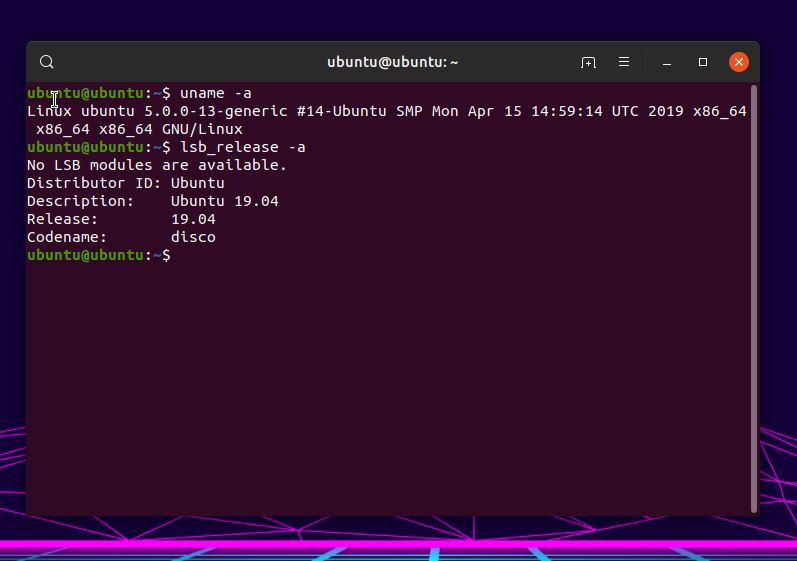Welcome to the Ubuntu Linux operating system, an open-source and free GNU/Linux distribution derived from the award-winning Debian GNU/Linux project. Distributed as 64-bit/32-bit Live ISO images for the Desktop Edition. Ubuntu 16.04 LTS is currently distributed as two Live ISO images for the Desktop. According to Swift's official website its supported platforms are: Ubuntu 14.04 Ubuntu 16.04 Ubuntu 18.04 Is there any way to install it on a machine running Ubuntu 19.04? Download Ubuntu desktop, Ubuntu Server, Ubuntu for Raspberry Pi and IoT devices, Ubuntu Core and all the Ubuntu flavours. Ubuntu is an open-source software platform that runs everywhere from the PC to the server and the cloud. The new Ubuntu 19.04 ( Disco Dingo) is released and available for download! For students and new users who want to learn how to install the new Ubuntu 19.04 on a physical or virtual guest machine, the steps below should be a good place to start. This brief tutorial is going to show you how to install the just released and refreshed Ubuntu 19.04 on your laptop, desktop or virtual guest.
Node.js on Ubuntu gives a way to write server-side scripting. It is an open source Javascript cross-platform that executes the Javascript outside the browsers. It uses an NPM package manager to fetch different packages and modules for function extensions of the app developed on Node.js. To install Node.js and NPM on latest Ubuntu 19.04, we don't need to add any kind PPA (personal package manager), however, there is an official PPA for Node.js that we can use to install latest versions of Nodejs & NPM on Ubuntu such as 19.04, 18.04 LTS, 16.04 LTS (Trusty Tahr) and 14.04 LTS (Xenial Xerus) Linux servers.
As I said it is cross-platform so we can install it on MacOS and Windows too. For NPM & Node.js Windows installation, see tutorial: Install npm and node.js packages on Windows 10/8/7 Oblivion official site.
Install NPM & Node js on Ubuntu 19.04
Step 1: Offical PPA repository for Node.js
Open the command terminal on Ubuntu Linux and add the official repository for downloading and installing the NPM and Node.js. The Long term stable release of Node.js is 10.15.3 LTS and a current stable release is 11.14.0. By default, the user will get the long term stable version 10.15.3 on Ubuntu 19.04, however, we can install the current version using Node.js PPA.
For long term version, we don't need to add the repo, just type the commands:
Note: Without adding latest PPA manually, the user will get Node.js LTS 10.x version from Ubuntu 19.04 repo. So to get a current 11.X release, add the below official repo.
For latest Node.js version 11.x use this PPA:
For 10.X version Node.js use this repo.
Note: As we are using 11.x repo on Ubuntu 19.04, here.
Step 2: Update your system.
After adding the Node.js Repo run the system update command:
Step 3: Command to install the Node.js on Ubuntu 19.04
Note: Without PPA we have to install Node and NPM using two different commands, however, those are using the PPA will get both Nodejs and NPM using single below command:
Step 4 Install NPM on Ubuntu 190.4 via command
After installing the Node.js, use this command to set up the NPM package manager on Ubuntu 19.04
Step 5: Check the installed Node and NPM version on Ubuntu
Versions on Ubuntu 19.04 without using PPA- LTS versions
To check the Node version on Ubuntu, the command is:
To check the NPM version, the command is:
After using the Latest Node.js PPA repo, the latest version–
Step 7: Command to upgrade NVM and Node (optional)
Ubuntu 19 32 Bit
Note: If you are using the PPA, simply run sudo apt update
First, update npm,
Then update node to the next version,
Step 6: Command to select previous version npm on Ubuntu 19.04 (optional)
Note: Run these commands, if you know what are you doing otherwise it could mess your NPm setup.
Command to see the older available version on Ubuntu
Command to select the previous NPM version
For example, I want to select the older 5.8.0 version then the command will be:
or
Step 7: Let's install something using NPM (options step):
For example, we want to install Angular CLI using NPM then the commands will like this:
For locally:
Fo Globally: -g syntax refers to the global
Step 8: Uninstall node js ubuntu
Ubuntu 19 10 Download
The command to uninstall node.js on Ubuntu is:
To uninstall Nodejs
To uninstall NPM

Completely remove NPM related entries:
Other Tutorials:
